‘Be bloody, bold, and resolute’: Big Telly Theatre
Harriet Clifford
Friday, December 18, 2020
The team at Big Telly Theatre don't just think outside the box – they obliterate the very concept of the box. Harriet Clifford speaks to artistic director Zoe Seaton after experiencing her lockdown production of 'Macbeth' via Zoom.
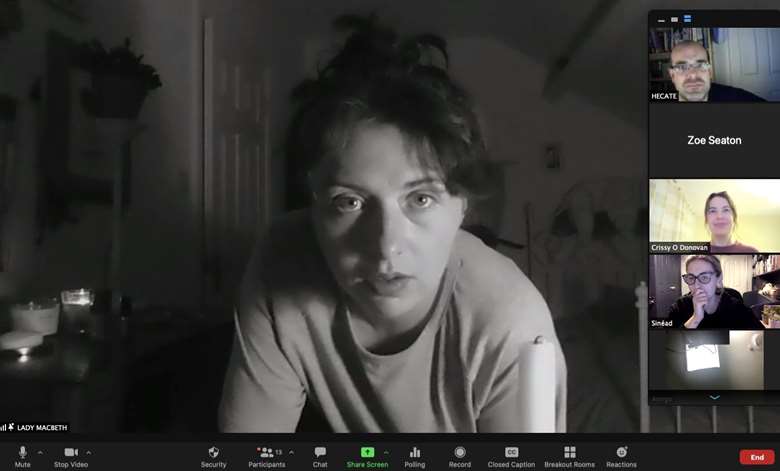
‘Dim those lights, close those curtains, stay in your rooms, and be vigilant’. Another government variation on #StayAlert, equally vague, but this time for those in self-isolation from the rest of their household? No, thank goodness – rather, the mantra drummed into all viewers of Big Telly Theatre's production of Macbeth, live streamed via Zoom throughout October.
The play was the Northern Irish theatre company's second Zoom performance, having produced The Tempest three weeks after the first national lockdown. Big Telly's co-founder and artistic director, Zoe Seaton, explains, ‘When lockdown happened, Big Telly was running six projects, and we basically had to tell all of our artists to go home. But we could pay them, so that meant that we had about 15 or 20 brilliant artists on the payroll and at home, so we started experimenting with isolation theatre.’
Immersive theatre online
Initially using WhatsApp calls, the company began to ask themselves: how do you make immersion happen? How do you step into the world of the audience? How to you make people feel that they are not in their studies or living rooms? Although initially unsure of the audience response, Seaton tells me, ‘There was a point where Ariel said to people, “I need you to make bird sounds and pretend we're in a jungle”. Going onto “gallery view”, you'd see that half the audience were standing on the backs of their sofas with their arms out, getting ready to fly.’
I must admit, settling down on my bed one evening to experience Macbeth, I was a little apprehensive about the part of the pre-show email that read: ‘For the optimum experience, we recommend that your CAMERA IS ON.’ I wasn't sure how I felt about a group of strangers being able to see me propped up against a pillow, wearing ‘loungewear’, and drinking coffee from a mug emblazoned with ‘Crazy Cat Lady’.
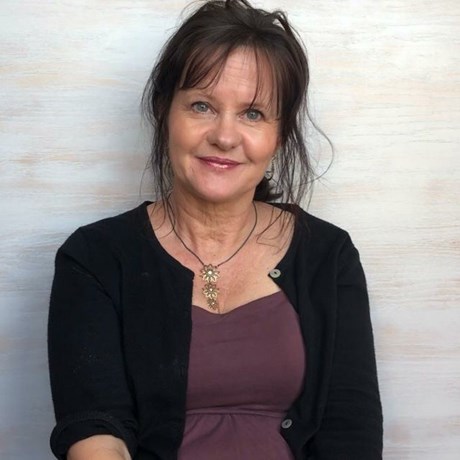
Zoe Seaton, artistic director
Nevertheless, I found myself enjoying the communal, interactive feeling, realising that there were 67 other participating screens (on this particular evening), behind which people like me were sitting at home, missing theatre and wanting to engage in something creative.
Big Telly specialises in site-responsive or site-specific theatre – lockdown or not – and Seaton explains, ‘What I sometimes find a bit boring about theatre, about venues, is the kind of formula – the arrival in the foyer, the getting your ticket, the hanging up your coat – all of the ritual of that can sometimes make it feel predictable.
‘In site-specific theatre, it's all up for grabs. You can reinvent what the procedures and rules are – where people sit, how people interact – so it can feel very playful.’ Pre-lockdown, Big Telly performed in swimming pools, and even has a four-seater portable theatre – a converted horsebox with ‘two seats in the balcony and two seats in the stalls.’
Incredibly, the actors in Macbeth, Seaton explains, have never met in real life (other than when Macbeth and Lady Macbeth met socially in a pub about ten years ago). Seaton has worked with Nicky Harley (Lady Macbeth) a lot in ‘the real world’, and with Dennis Herdman (Macbeth) only once. As well as each playing a Witch, Aonghus Og McAnally plays King Duncan and Macduff, Lucia McAnespie plays Lady Macduff and Malcolm, and Dharmesh Patel plays Banquo.
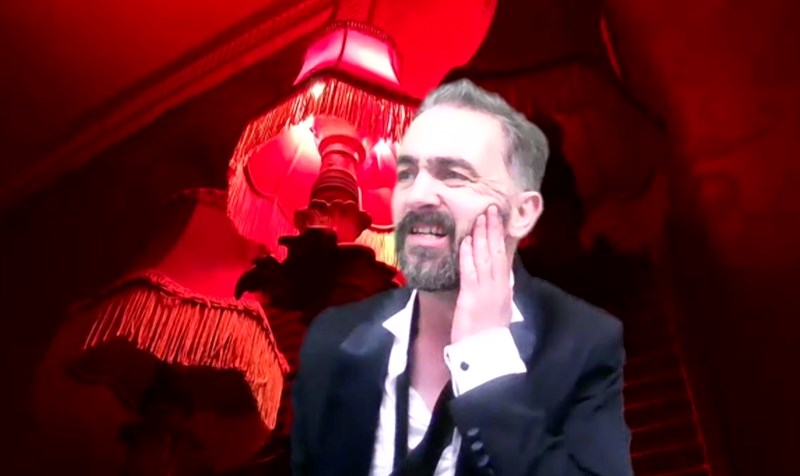
Dennis Herdman on Zoom as Macbeth
‘We did auditions on Zoom. It's really helpful to audition in the format that the show's going to be – you don't often do that.’ She goes on, ‘Those rehearsals for Macbeth were absolutely joyous. Every time we were all together, it felt like a gift, because people were so generous, playful, optimistic, and warm. You're not looking for actors who might be more introverted, or broody – we don't need that, particularly in the middle of a pandemic. We needed that joy, and all those actors were playful on Zoom.’
Creativity in a new medium
Playful they were, opening the show with a ‘daily briefing’ about the threat of witchcraft, rather than a deadly pandemic, with three actors superimposed onto three podiums. Seaton says, ‘Of course, we were making a political point about theatres being closed – I struggle with that. But also, we didn't rehearse any of that until the final few days because we said we needed to be really sensitive to what's happening. I just really needed to acknowledge the audience at the beginning.’
Slick, ingenious, innovative, and enthralling, there was no chance of hearing 2020's tagline – ‘You're on mute!’ – despite each of the five actors performing Macbeth live from their bedrooms, while also managing the complex technology involved in such a feat. With green screens, backgrounds, image layering, camera angles, sound effects, and costumes all being changed live on Zoom for all viewers to see, the play was worth watching for the sheer technological prowess alone.
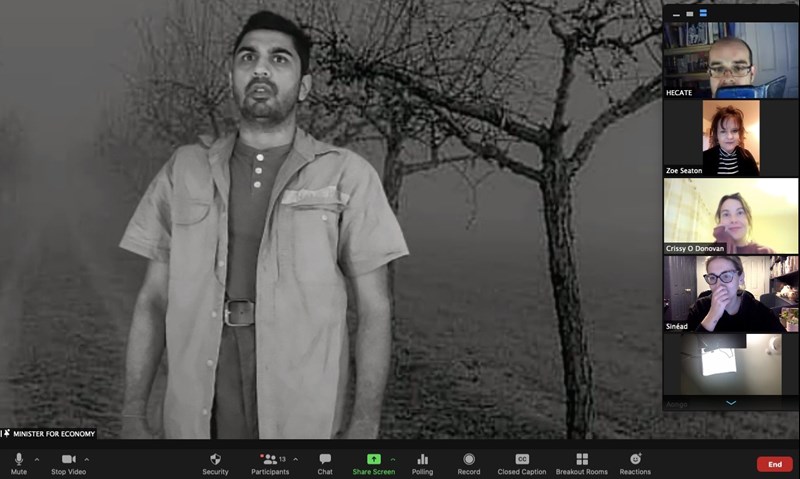
Impressed, I asked Seaton whether they had used the video communication platform previously. ‘No, we were totally new to it – I didn't know what it was. It was only when I realised that the camera in “speaker view” would follow the speaker that I thought we could make theatre using this.’
‘There's one bit in Macbeth where Dennis is saying his speech, “Life is but a walking shadow”, while we show a film of Nicky walking into the sea. However, he is saying it while lifting a box off his computer, changing the virtual background, changing the filter to go to black and white, turning off a bike light, and doing a costume change. I just think the dexterity required of actors probably gets more demanding.’ As I was watching, it was difficult to work out which bits were live, and which were pre-recorded, adding to the mystery and intrigue.
She also explains that Harley, now experienced in Zoom theatre, is using two different rooms – one with a green screen, one without – four different webcams, a phone, and a laptop. ‘She's able to do that level of tech – I wouldn't have put every actor in that position.’
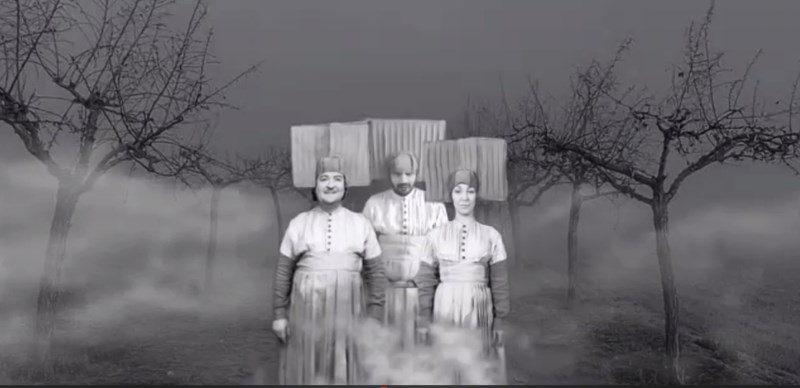
In the spotlight
Aside from the technology, the quality of the acting itself was vital for carrying the show. Alone in their bedrooms, there was nowhere for the actors to hide. There was no need, as they were all brilliant, switching deftly between scenes and ingeniously utilising the limited space available to them, seemingly speaking to each other in the same room, despite being in different cities.
During a scene of heightened emotion for guilt-ridden Macbeth and Lady Macbeth, Herdman and Harley are seen on the move in the dark, their faces full-screen, wild-eyed, breathing heavily and whispering anxiously to each other. In the best possible way, it reminded me of one of those self-taped ghost-hunting documentaries, in which a terrified ghost buff films themselves investigating a dark hallway, jerking around at an unflattering angle.
The ‘set’ was engaging and inventive, with the characters largely appearing in black and white, but their backgrounds sometimes turning a deep, blood red, or with unexpected props (like a feather boa or a seemingly random video of a dancing dog) popping up out of nowhere. The abstract additions meant that there were moments in which I felt a little lost, and I think someone with no prior knowledge of Macbeth's storyline may have struggled slightly, but the entertainment and interaction were maintained, holding my attention throughout.
A technical hitch
If the last 7 months have taught us anything, it's that technology is both useful and incredibly unpredictable. Seaton says, ‘We would do a lot of work in the real world where we might do a show on the street and anything might happen and get incorporated in, so there's unpredictability within all our work. I like the fact that in Macbeth, we say that if your internet goes down, it could be the witches, so we're attributing it to something within our story world. It can be stressful for actors who get kicked out during shows, but that just means that other actors cover for them.’
The witches must have found me, then, as my internet went down mid-show, and I was kicked off Zoom for around 10 minutes. The reconnection to the call was smooth, and I was drawn back into Shakespeare's chaotic world almost immediately. Despite the potential for poor internet connection, Seaton says that Zoom theatre is ‘massively’ more accessible, allowing those who may be permanently housebound, living far away from a theatre, unable to afford normal theatre, or afraid of a formal theatre setting for whatever reason, to access and enjoy a professional show.
It is thanks to the inventiveness and resourcefulness of this production that Seaton is able to say, ‘I feel so optimistic about the future of artists, because I'm been so impressed with how adaptable they've been.’ These words, along with the unexpectedly moving final minutes of the Zoom after Macbeth is finished – Seaton appears full screen to speak to the audience, asks us all to switch to “gallery view” and hold up a piece of paper with our location written on it – make me all the more desperate for the witches to look into our futures, too, and say:
First Witch: When shall we three meet again?/In thunder, lightening, or in rain?
Second Witch: When the hurly-burly's done,/When the battle's lost, and won.
Keep up to date on Twitter @BigTellyNI or online www.big-telly.com

